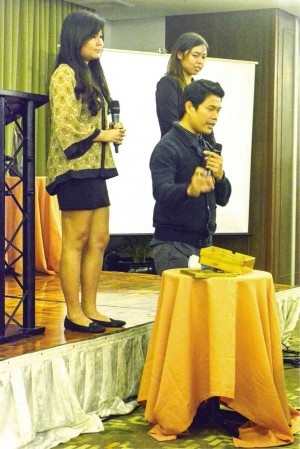Silliman University (SU) won the first Benilde Prize with its innovative social design, ‘’The Bamboard Game Project.’’
The team received P500,000 in grant money and a trophy designed by Ann Pamintuan.
Other winners were the Green Roof Project of De La Salle-College of Saint Benilde (DLS-CSB), Disaster Tycoon of University of Immaculate Conception, Still Mind of University of Immaculate Conception Davao and Ban Aids of University of St. La Salle Bacolod.
The Benilde Prize for Design Excellence, launched by DLS-CSB last year, seeks innovative ideas from student teams on how to achieve the Millennium Development Goals and Sustainable Development Goals.
SU winning team members Queenie Maria Guibao, Cindy Bonachita and Khail Santia, assisted by team adviser Shariff Ivan Datar, came up with a “customizable, multirule set” board game made of bamboo and designed to combine fun and education.
The Bamboard Game Project, the SU team said, aimed to address the high dropout problem in the country and promote joyful learning of basic Mathematics among school dropouts.
The team said it wanted to make learning fun because all its members were also “disengaged learners.”
The Bamboard Game Project, the team said, combined two concepts that currently seemed to be mutually exclusive—formal education and games.
“This project harnesses the power of innovative and sustainable game design to revitalize our basic education system, to create a system that is not based on coercion but on the joy of learning,” the team said.
On awards night, the team presented a prototype of the Bamboard game and explained briefly its mechanics. It said the project would not only reach out to marginalized children but also give livelihood opportunities to bamboo craftsmen in Dumaguete City.
Contest judge JL Cacho of Smart Communications suggested that the team develop an online application version. He said an app version could reach students in private schools to broaden the target market.
Santia, a computer science major, said he had been developing video games for almost eight years now and could see the potential benefits of an app version of the board game.
“Lack of engagement in school is not confined to rural areas but inflicts urban children, as well. So this definitely is an avenue for growth. Unlike a board game, apps have very little distribution cost, which will allow us to reach a global audience more quickly,” Santia said.
The Bamboard team and nine other semifinalists joined the Benilde Bootcamp, a rigorous three-day program where they were mentored in the development of their social design ideas and prototypes.
The mentors included ClicknComplain cofounder Rachel Eilbott, Enfants du Mékong Entrepreneurs social impact consulting lead Emma Stokking, Portfolio MNL founder Rina Malonzo, Virlanie Foundation executive director Peachy Pacquing, Philippine Business for Social Progress corporate affairs head Jay Jaboneta, and Benilde associate dean for new media Abigail Mapua-Cabanilla.
“The boot camp pushed us to our limits. It was pretty helpful. It made us better understand the core of our advocacy. The mentors were awesome and we’re quite thankful that they taught us how to deliver excellently our pitch to convey our ideas,” the Bamboard team said.
After the boot camp, 10 semifinalists were selected by the judges composed of, aside from Cacho, Karl Santinigan, head of the Office of Sen. Paolo Benigno Aquino IV’s programs unit; Sustainable Livelihood Director Georgina Ann Hernandez of the Department of Social Welfare and Development; Director Nerissa Esguerra of the National Economic and Development Authority Development Information Staff; UN Habitat governance and institutional development specialist Jon Gales; and Human Nature founder Anna Meloto-Wilk.
“We were really impressed by the Benilde Prize winner… they came up with a tactile game that really addressed a problem—Math literacy of the Filipinos. The game can translate into digital media, which is very relevant to the way young people interact with their environment at the moment,” Meloto-Wilk said.
The team is expected to use the grant for the implementation of its prototype. It has six months to develop the design with the help of mentors and concerned partners and agencies.
The team said the Benilde Prize did not just give them bragging rights but also a social responsibility. Members said they had to start testing their social design idea and help transform society for the better.
Almost 70 teams from different schools and universities all over the country participated in the competition.
